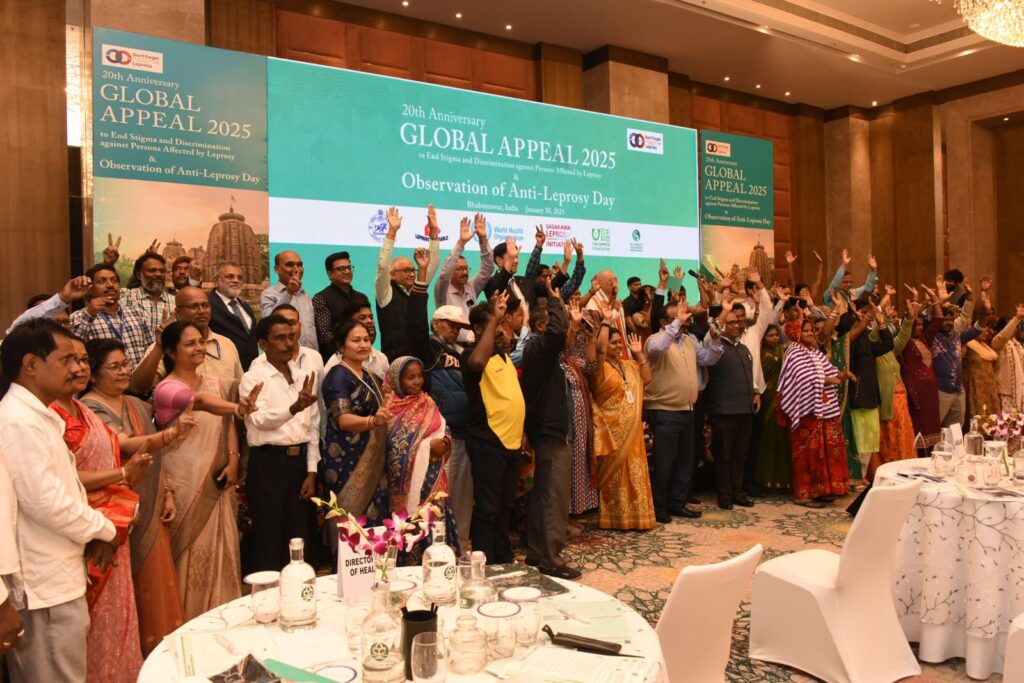30th January observed as Anti-Leprosy Day in India to mark Mahatma Gandhi’s death anniversary
Global Appeal 2025 to End Stigma and Discrimination Against Persons Affected by Leprosy was launched in Bhubaneswar, Odisha, with endorsements from the health ministries of 56 countries worldwide. The launch, co-hosted by the World Health Organization (WHO) and Sasakawa Leprosy (Hansen’s Disease) Initiative, brought together persons affected by leprosy from many Indian states, the Odisha Ministry of Health, and several other experts and advocates for leprosy elimination. The launch of Global Appeal 2025 began with a message from Ms. Jayanti Pradhan, a person affected by leprosy from Odisha.

Indian Minister of Health and Family Welfare, Mr. Jagat Prakash Nadda, shared a message that was read out during the event: “If leprosy is diagnosed early, the person can lead a normal, healthy life. A delay in diagnosis may lead to disabilities. People should learn to recognize the signs of leprosy and voluntarily come forward for diagnosis and treatment. Leprosy is not just a health issue—it is also a social issue. Stigma and discrimination hinder progress toward eliminating the disease and violate the rights of those affected by it. Let us help each other stop leprosy-related stigma and discrimination.”
Mr. Mukesh Mahaling, Minister of Health and Family Welfare, Odisha government, stated: “The Indian government, as well as the Odisha government, has a roadmap to eradicate leprosy by 2030. Leprosy is curable. It is inspiring to see people who were affected by leprosy championing the cause and becoming advocates. We are working together with the Sasakawa Leprosy (Hansen’s Disease) Initiative (SLI) for leprosy elimination in Odisha. SLI is collaborating with local governments in over 40 countries to help eliminate leprosy from the world.”
WHO Goodwill Ambassador for Leprosy Elimination, Mr. Yohei Sasakawa, highlighted that 2025 marks the 20th anniversary since the Global Appeal was first launched in Delhi in 2006. Since then, several Nobel Peace Prize laureates and other influential leaders have endorsed the call to end leprosy-related stigma and discrimination. He also praised India’s Prime Minister, Mr. Narendra Modi, for his commitment to achieving the ambitious goal of a leprosy-free world by 2030. “If we join hands and combine our efforts, the vision of a leprosy-free world is not an impossible dream—together, we can make it possible.”
Dr. Nilakantha Mishra, Director of Public Health, Ministry of Health and Family Welfare, Odisha, emphasized: “India and Odisha are already on the pathway to eliminating the disease. However, unless we eliminate stigma and discrimination, people will face barriers to getting diagnosed and cured—leading to complications such as leprosy-related disabilities.”
Every Monday is Leprosy Day
Dr. Kshetra Mohan Kand, Additional Director of Health (Leprosy) for the Odisha Government, provided key statistics on leprosy prevalence. He noted that India has a leprosy prevalence rate of 0.60 per 10,000 population, while Odisha has a rate of 1.48. The target is to reduce prevalence to below 1 per 10,000 population. Likewise, 7.4 new leprosy cases are detected in India annually per 100,000 population, while in Odisha, the number is 18.2 per 100,000 population. The goal is to reduce new cases to under 10 per 100,000 population. Currently, 13 districts in Odisha are classified as high-prevalence areas for leprosy.
Leprosy is now a reportable disease in Odisha, ensuring that private doctors refer individuals to government facilities where they can receive a full course of leprosy treatment. To strengthen efforts, every Monday has been designated as “Leprosy Day,” when all health services—including provision of medicine, examination of presumptive cases, ulcer dressing, physiotherapy, counseling, and other necessary services—are made available.
Ms. Maya Ranavare, a person affected by leprosy from Maharashtra, shared her personal experience: “Both my parents were affected by leprosy. Ending stigma and discrimination against persons affected by leprosy is critical because it impacts every aspect of life—social status, employment, education, marriage, and access to basic amenities. Unfortunately, despite advancements in medicine and technology, leprosy-related stigma still exists. To break this vicious cycle, it is essential to foster awareness and education.”
Nearly 100 persons affected by leprosy were honored at the event for their contributions to ending leprosy-related stigma and discrimination and for advocating for stronger efforts to eliminate the disease by 2030.
Dr. Takahiro Nanri, President of the Sasakawa Health Foundation and Sasakawa Leprosy (Hansen’s Disease) Initiative, reaffirmed the commitment to ending stigma and discrimination: “Unfortunately, persons affected by leprosy and their family members still face a great deal of stigma and discrimination. We must end all forms of leprosy-related stigma and discrimination. We will continue issuing the Global Appeal until we achieve our vision of a world where no one suffers from leprosy—and where the Global Appeal is no longer needed.”
Additionally, SAPNA, a mascot for the National Leprosy Eradication Programme, was launched alongside Global Appeal 2025 to promote awareness and reinforce the commitment to ending stigma and discrimination against persons affected by leprosy.


